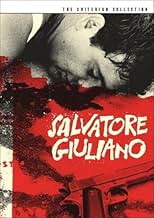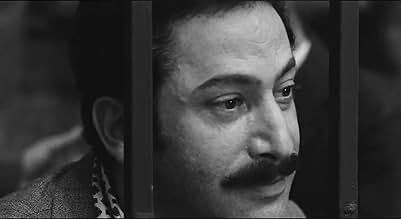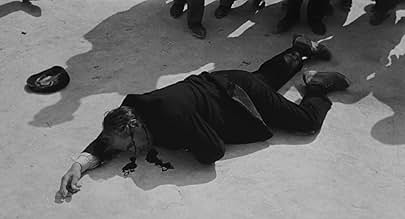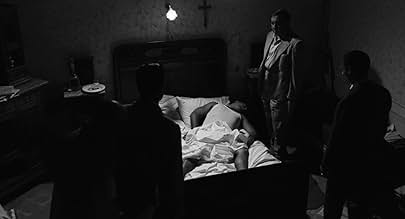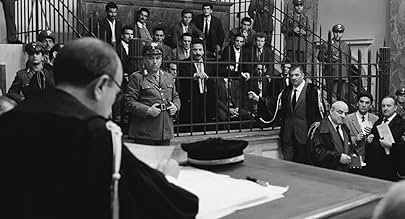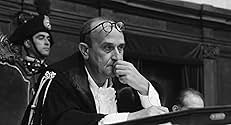NOTE IMDb
7,3/10
5,4 k
MA NOTE
Les méandres nébuleux et compliqués des relations entre le pouvoir gouvernemental, le parti indépendantiste et la mafia dans la Sicile des années 40 culminent avec la mort de Salvatore Giuli... Tout lireLes méandres nébuleux et compliqués des relations entre le pouvoir gouvernemental, le parti indépendantiste et la mafia dans la Sicile des années 40 culminent avec la mort de Salvatore Giuliano.Les méandres nébuleux et compliqués des relations entre le pouvoir gouvernemental, le parti indépendantiste et la mafia dans la Sicile des années 40 culminent avec la mort de Salvatore Giuliano.
- Réalisation
- Scénario
- Casting principal
- Récompenses
- 6 victoires et 4 nominations au total
Frederico Zardi
- Pisciotta's Defense Counsel
- (non crédité)
Pippo Agusta
- Minor Role
- (non crédité)
Sennuccio Benelli
- Reporter
- (non crédité)
Giuseppe Calandra
- Minor Official
- (non crédité)
Pietro Cammarata
- Salvatore Giuliano
- (non crédité)
Max Cartier
- Francesco
- (non crédité)
Nando Cicero
- Bandit
- (non crédité)
Pietro Franzone
- Seperatist
- (non crédité)
Giovanni Gallina
- Bit Part
- (non crédité)
Vincenzo Norvese
- Bit Part
- (non crédité)
Carmelo Oliviero
- Don Nitto Minasola
- (non crédité)
Renato Pinciroli
- Pinciroli
- (non crédité)
Francesco Rosi
- Narrator
- (voix)
- (non crédité)
Giuseppe Teti
- Priest of Montelepre
- (non crédité)
Cosimo Torino
- Frank Mannino
- (non crédité)
Avis à la une
Interesting neo-realistic, quasi-documentary film with notable editing. But did the film deserve the Best Director award at Berlin over Bergman's "Through a glass darkly"? The Swedish film was superior. Martin Scorsese likes it because he can identify with the Italian politics and sociology of that time. The Rosi film is good but overrated.
Filmed in the actual Siciilian locations, this film is a fair attempt to strip away the myth surrounding bandit-cum-revolutionary Giuliano. In fact, he doesn't appear except as a gunned-down corpse at the beginning. The film winds back to unravel the events leading to his death, and forwards to its consequence. This is a clever method of achieving objectivity while at the same time subtly emphasising the man's elusive and mysterious qualities. To show Giuliano would have either been either hagiography or iconoclasm. The film rose above that and broadened its inquiry into the wider social and political context, effectively belittling him as the puppet of various forces jostling for position in Sicily after the war: bandits, police, local aristocracy, the Italian government, communists, and the Mafia.
This sets quite a challenge for itself, partly because of the vacuum at its centre, partly because of the obscurity and complexity of the real events. We are delivered to a chaotic courtroom to try to piece it together. The film finally latches onto Giuliano's lieutenant the only one who seems to know something of what is going on - but even he is silenced. It's all the more disturbing for the confusion.
Rosi is one of the best directors of crowds scenes and he gives raucous energy to any gathering of men, especially in the courtroom. He induces a kind of group hysteria in his actors; they are totally unaware of the camera and the result is an almost disturbing hyper-real feel (real crowds are dull in comparison) it's really something to appreciate. To get into this film, you need to invest something in the passions of the various parties involved - if not sympathise with them, then at least understand them. Without this, the danger is that it all boils down to so much petty bickering. The same might be said of the Godfather, which clearly owes a huge debt to Rosi's style.
Influential then, somewhat brave, with some fine directorial moments, and an interesting history lesson. Hard to actually like, but hard not to admire.
This sets quite a challenge for itself, partly because of the vacuum at its centre, partly because of the obscurity and complexity of the real events. We are delivered to a chaotic courtroom to try to piece it together. The film finally latches onto Giuliano's lieutenant the only one who seems to know something of what is going on - but even he is silenced. It's all the more disturbing for the confusion.
Rosi is one of the best directors of crowds scenes and he gives raucous energy to any gathering of men, especially in the courtroom. He induces a kind of group hysteria in his actors; they are totally unaware of the camera and the result is an almost disturbing hyper-real feel (real crowds are dull in comparison) it's really something to appreciate. To get into this film, you need to invest something in the passions of the various parties involved - if not sympathise with them, then at least understand them. Without this, the danger is that it all boils down to so much petty bickering. The same might be said of the Godfather, which clearly owes a huge debt to Rosi's style.
Influential then, somewhat brave, with some fine directorial moments, and an interesting history lesson. Hard to actually like, but hard not to admire.
Review of Salvatore Giuliano (1962)
Directed by Francesco Rosi, Salvatore Giuliano (1962) is a gripping, politically charged Italian film that blends the genres of crime drama and historical reconstruction. The film portrays the life and death of Salvatore Giuliano, a real-life Sicilian bandit who became a legendary figure in post-war Italy. Giuliano's story is tragic, marked by his transformation from a rebellious hero to a notorious outlaw and his eventual murder under mysterious circumstances.
Rosi's approach to the material is unique. The film doesn't rely on a traditional narrative structure but instead unfolds in a fragmented, almost documentary-like fashion, presenting the story from various perspectives. This method of storytelling creates a sense of disorientation, mirroring the confusion and corruption of the political and social forces at play in post-WWII Sicily. By juxtaposing the personal tragedy of Giuliano with the larger political landscape of Italy, the film reveals the complex intersections between crime, politics, and the Sicilian mafia.
The performances are strong, with a particularly noteworthy portrayal of Giuliano by Marcello Mastroianni, whose quiet intensity brings depth to a character that is both a symbol of resistance and a product of the violent environment in which he lives. Rosi's direction maintains a cold, observational tone, which works well to emphasize the film's themes of disillusionment and betrayal.
Visually, the film is stunning, with cinematography that captures the stark beauty of the Sicilian landscape while also reflecting the harsh realities of life for the people caught in the web of organized crime and political corruption. The stark black-and-white visuals, coupled with the atmospheric score by Francesco De Masi, enhance the film's somber and tense mood.
Salvatore Giuliano is an excellent example of the political cinema that emerged in Italy during the post-neorealist era. It's not just a crime story; it's an exploration of the corruption and disillusionment that permeated Italian society during the 1940s and '50s. While the film might feel slow or fragmented at times, its depth and ambition make it a fascinating and insightful watch for those interested in the intersection of politics, history, and cinema.
Rating: 4/5 - A thought-provoking, well-crafted historical drama that shines a light on the murky intersection of crime and politics in post-war Sicily.
Directed by Francesco Rosi, Salvatore Giuliano (1962) is a gripping, politically charged Italian film that blends the genres of crime drama and historical reconstruction. The film portrays the life and death of Salvatore Giuliano, a real-life Sicilian bandit who became a legendary figure in post-war Italy. Giuliano's story is tragic, marked by his transformation from a rebellious hero to a notorious outlaw and his eventual murder under mysterious circumstances.
Rosi's approach to the material is unique. The film doesn't rely on a traditional narrative structure but instead unfolds in a fragmented, almost documentary-like fashion, presenting the story from various perspectives. This method of storytelling creates a sense of disorientation, mirroring the confusion and corruption of the political and social forces at play in post-WWII Sicily. By juxtaposing the personal tragedy of Giuliano with the larger political landscape of Italy, the film reveals the complex intersections between crime, politics, and the Sicilian mafia.
The performances are strong, with a particularly noteworthy portrayal of Giuliano by Marcello Mastroianni, whose quiet intensity brings depth to a character that is both a symbol of resistance and a product of the violent environment in which he lives. Rosi's direction maintains a cold, observational tone, which works well to emphasize the film's themes of disillusionment and betrayal.
Visually, the film is stunning, with cinematography that captures the stark beauty of the Sicilian landscape while also reflecting the harsh realities of life for the people caught in the web of organized crime and political corruption. The stark black-and-white visuals, coupled with the atmospheric score by Francesco De Masi, enhance the film's somber and tense mood.
Salvatore Giuliano is an excellent example of the political cinema that emerged in Italy during the post-neorealist era. It's not just a crime story; it's an exploration of the corruption and disillusionment that permeated Italian society during the 1940s and '50s. While the film might feel slow or fragmented at times, its depth and ambition make it a fascinating and insightful watch for those interested in the intersection of politics, history, and cinema.
Rating: 4/5 - A thought-provoking, well-crafted historical drama that shines a light on the murky intersection of crime and politics in post-war Sicily.
Through the first hour of this film there are no focused characters, at most a character is seen in two or three short scenes. It's basically just following history and showing examples of it. Luckily it's not rushed, it's decently paced and it is realistic.
The best way to describe this is to call it a docu-drama. A narrator tells you something and then some people either do what's described or continues where the narrator leaves off. Though this approach can work, I did find it distancing in this film and it did make me less interested. The above competent direction and photography did elevate it however and for a long time I felt that it was great.
The films main problem is that we never really get to know anything, least of all about the title character who is despite the entire film being about his history only seen dead, or walking/running around. He only has a few lines.
Then towards the middle we experience two horrendous acts of overacting which damages the film severely. Both involving screaming/crying, the worst offender was the woman playing Giulianos mother. She screams and cries so awfully and in such a high tone that you wonder if you are watching a cheap parody. This scene is agonizingly long.
We do however learn a lot about the conflict going on and after a bit more than an hour, perhaps closer to 90 mins we get one character to follow. Overall I just don't think the film put us inside the conflict and despite giving us historical facts and let us understand the events we never got to the core. This made it cold and somewhat uninteresting for time to time. Not a film I would recommend but definitely a more or less good film.
6.5/10
The best way to describe this is to call it a docu-drama. A narrator tells you something and then some people either do what's described or continues where the narrator leaves off. Though this approach can work, I did find it distancing in this film and it did make me less interested. The above competent direction and photography did elevate it however and for a long time I felt that it was great.
The films main problem is that we never really get to know anything, least of all about the title character who is despite the entire film being about his history only seen dead, or walking/running around. He only has a few lines.
Then towards the middle we experience two horrendous acts of overacting which damages the film severely. Both involving screaming/crying, the worst offender was the woman playing Giulianos mother. She screams and cries so awfully and in such a high tone that you wonder if you are watching a cheap parody. This scene is agonizingly long.
We do however learn a lot about the conflict going on and after a bit more than an hour, perhaps closer to 90 mins we get one character to follow. Overall I just don't think the film put us inside the conflict and despite giving us historical facts and let us understand the events we never got to the core. This made it cold and somewhat uninteresting for time to time. Not a film I would recommend but definitely a more or less good film.
6.5/10
The first time you experience this film is rather like going to an opera without knowing the plot: there are some grand scenes of murder and passion, some incredible scenery, but it's long and you're in a suspended state of confusion much of the time--and it's a two-hour film, almost a documentary.
The second time you watch this film (and you should!) it can be enjoyed on so many levels, and you begin to appreciate Rosi's genius for mixing various kinds of truth, for exposing the sorts of lies governmental bodies can develop to protect their flanks, for demythologizing the idea of the folk outlaw whose ideals are supposedly those of the people. At heart this is a film about Sicily, about an island's struggle to find it's heart and it's heritage--not easy to watch, but magnificently photographed at every turn.
The second time you watch this film (and you should!) it can be enjoyed on so many levels, and you begin to appreciate Rosi's genius for mixing various kinds of truth, for exposing the sorts of lies governmental bodies can develop to protect their flanks, for demythologizing the idea of the folk outlaw whose ideals are supposedly those of the people. At heart this is a film about Sicily, about an island's struggle to find it's heart and it's heritage--not easy to watch, but magnificently photographed at every turn.
Le saviez-vous
- AnecdotesMartin Scorsese credits this film as being one of his many inspirational sources for the look and style of his Taxi Driver (1976).
- GaffesWhen his mother comes to view and identify his corpse, Salvatore's stomach clearly moves as the actor struggles to control his breathing.
- ConnexionsEdited into Il sasso in bocca (1970)
Meilleurs choix
Connectez-vous pour évaluer et suivre la liste de favoris afin de recevoir des recommandations personnalisées
- How long is Salvatore Giuliano?Alimenté par Alexa
Détails
- Date de sortie
- Pays d’origine
- Langue
- Aussi connu sous le nom de
- Wer erschoß Salvatore G.?
- Lieux de tournage
- 98 Via Serafino Mannone, Castelvetrano, Trapani, Sicily, Italie(Giuliano's body)
- Sociétés de production
- Voir plus de crédits d'entreprise sur IMDbPro
- Durée2 heures 3 minutes
- Couleur
- Mixage
- Rapport de forme
- 1.85 : 1
Contribuer à cette page
Suggérer une modification ou ajouter du contenu manquant

